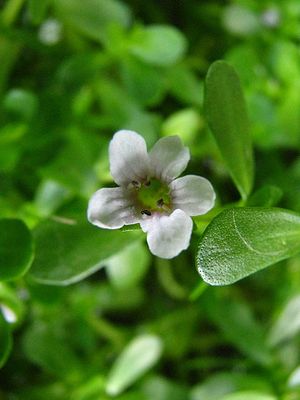Note: This is a project under development. The articles on this wiki are just being initiated and broadly incomplete. You can Help creating new pages.
Difference between revisions of "Bacopa monnieri - Brahmi"
| Line 3: | Line 3: | ||
==Uses== | ==Uses== | ||
| − | {{Uses|Epilepsy}}, {{Uses|Asthma}}, {{Uses|Ulcers}}, {{Uses| | + | {{Uses|Epilepsy}}, {{Uses|Asthma}}, {{Uses|Ulcers}}, {{Uses|Tumors}}, {{Uses|Gastroenteritis}}, {{Uses|Ascites}}, {{Uses|Enlarged spleen}}, {{Uses|Anemia}}, {{Uses|Inflammations}}, {{Uses|Leprosy}} |
==Parts Used== | ==Parts Used== | ||
Revision as of 15:43, 30 September 2018
Bacopa Monnieri is a non-aromatic herb. Its ability to grow in water makes it a popular aquarium plant. It can even grow in slightly brackish conditions.The whole herb is used medicinally in India in a variety of ways. Bacopa is a genus of 70–100 aquatic plants belonging to the family Plantaginaceae.
Contents
- 1 Uses
- 2 Parts Used
- 3 Chemical Composition
- 4 Common names
- 5 Properties
- 6 Habit
- 7 Identification
- 8 List of Ayurvedic medicine in which the herb is used
- 9 Where to get the saplings
- 10 Mode of Propagation
- 11 How to plant/cultivate
- 12 Commonly seen growing in areas
- 13 Photo Gallery
- 14 References
- 15 External Links
Uses
Epilepsy, Asthma, Ulcers, Tumors, Gastroenteritis, Ascites, Enlarged spleen, Anemia, Inflammations, Leprosy
Parts Used
Chemical Composition
Brahmi contains the alkaloids brahmine, herpestine. It contains saponins namely bacosides A and B. It also contains betulic acid, stigmasterol, monnierin and hersaponin. Bacosides A and B on hydrolysis gives triterpenoid aglycone bacogenins A and B respectively.[1]
Common names
| Language | Common name |
|---|---|
| Kannada | Brahmi, Brahmi |
| Hindi | Brahmi |
| Malayalam | Brahmi |
| Tamil | Neer brahmi |
| Telugu | Sambrani aku |
| Marathi | NA |
| Gujarathi | NA |
| Punjabi | NA |
| Kashmiri | NA |
| Sanskrit | Brahmi |
| English | Indian pennywort |
Properties
Reference: Dravya - Substance, Rasa - Taste, Guna - Qualities, Veerya - Potency, Vipaka - Post-digesion effect, Karma - Pharmacological activity, Prabhava - Therepeutics.
Dravya
Rasa
Tikta (Bitter), Kashaya (Astringent)
Guna
Laghu (Light)
Veerya
Sheet (cold)
Vipaka
Madhura (Sweet)
Karma
Prabhava
Habit
Identification
Leaf
| Kind | Shape | Feature |
|---|---|---|
| small | oval | leaves that are succulent and relatively thick, Brahmi leaves grow alternately on the soft hairy stem |
Flower
| Type | Size | Color and composition | Stamen | More information |
|---|---|---|---|---|
| Unisexual | white-purplish | five petals | Brahmi flowers bloom in most months of the year |
Fruit
| Type | Size | Mass | Appearance | Seeds | More information |
|---|---|---|---|---|---|
| oval | Brahmi fruit is oval and sharp at apexWith hooked hairs | {{{5}}} | {{{6}}} |
Other features
List of Ayurvedic medicine in which the herb is used
- Vishatinduka Taila as root juice extract
Where to get the saplings
Mode of Propagation
How to plant/cultivate
Plants can be grown in warmer temperate climates through to tropical zones[3]
Commonly seen growing in areas
Moist and wet places, Wells, Irrigated fields, Borders of water, Channels.
Photo Gallery
References
External Links
- Ayurvedic Herbs known to be helpful to treat Epilepsy
- Ayurvedic Herbs known to be helpful to treat Asthma
- Ayurvedic Herbs known to be helpful to treat Ulcers
- Ayurvedic Herbs known to be helpful to treat Tumors
- Ayurvedic Herbs known to be helpful to treat Gastroenteritis
- Ayurvedic Herbs known to be helpful to treat Ascites
- Ayurvedic Herbs known to be helpful to treat Enlarged spleen
- Ayurvedic Herbs known to be helpful to treat Anemia
- Ayurvedic Herbs known to be helpful to treat Inflammations
- Ayurvedic Herbs known to be helpful to treat Leprosy
- Herbs with Root used in medicine
- Herbs with Stem used in medicine
- Herbs with Leaves used in medicine
- Herbs with common name in Kannada
- Herbs with common name in Hindi
- Herbs with common name in Malayalam
- Herbs with common name in Tamil
- Herbs with common name in Telugu
- Herbs with common name in Sanskrit
- Herbs with common name in English
- Habit - Herb
- Index of Plants which can be propagated by Seeds
- Index of Plants which can be propagated by Cuttings
- Herbs that are commonly seen in the region of Moist and wet places
- Herbs that are commonly seen in the region of Wells
- Herbs that are commonly seen in the region of Irrigated fields
- Herbs that are commonly seen in the region of Borders of water
- Herbs that are commonly seen in the region of Channels
- Herbs










